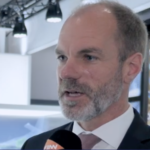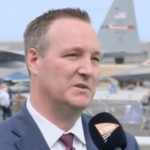The recent announcement of a H2ZERO partnership between easyJet and Rolls-Royce that will pioneer the development of hydrogen combustion engine technology capable of powering a range of aircraft will help the entire industry decarbonise, the low-cost carrier’s CEO, Johan Lundgren, said.
“It’s something that we are extraordinarily excited about,” Lundgren explained during an interview at the Farnborough International Airshow. “We have been on this journey about zero emission technology for quite a long time and now with Rolls Royce, we have a partner who is as passionate as we are about the prospect of decarbonisation.
“I think hydrogen in particular is one of the most promising technologies that is out there because it’s a well-known technology, it doesn’t emit any carbon emissions when in use, and it also reduces other parts of the emissions that other technologies don’t necessarily do.”
Engine tests
Both companies have committed to working together on a series of engine tests on the ground, starting later this year and have a shared ambition to take the technology into the air.
The objective of the partnership is to demonstrate that hydrogen has the potential to power a range of aircraft from the mid-2030s onwards.
Through H2ZERO, the companies will support an early concept ground test of a Rolls-Royce AE 2100 engine in the UK later this year. This will be followed by a full-scale ground test of a Rolls-Royce Pearl 15 jet engine – a range of location options are being assessed for this including the Rolls-Royce test facility in Mississippi, USA.
The programme will build on initial hydrogen combustion and fuel system rig tests that Rolls-Royce is undertaking with both Cranfield and Loughborough universities.
Benefits to entire sector
Lundgren said: “What I do like about this one in particular, is that it is a very practical thing where we kick it off immediately with testing that hopefully can lead to us at some point in time producing an engine that could benefit not only the EasyJet but the whole industry to decarbonise.
“We’re working together with Rolls Royce, they are the experts when it comes to the engine itself, the liquid storage and all of that, but what we are bringing into this and contributing is an operational skill set on what it would take for a commercial airline to use the equipment.”
https://www.youtube.com/watch?v=c-5E4boOvLU
Grazia Vittadini, chief technology officer at Rolls Royce, added: “It’s a fantastic opportunity we’re celebrating to really combine the Rolls Royce capability to decarbonise very hard-to-decarbonise sectors such as our aviation industry, together with the operational experience and drive of easyJet.
“It’s a fantastic opportunity to engage into a very thorough testing programme, to demonstrate the feasibility of hydrogen technologies onboard aircraft.”

